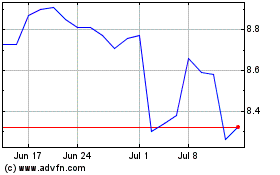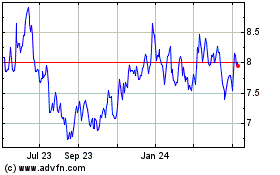U.S. Accuses Chinese Firm, Partner of Stealing Trade Secrets From Micron -- Update
November 01 2018 - 2:54PM
Dow Jones News
By Aruna Viswanatha, Kate O'Keeffe and Dustin Volz
U.S. authorities accused a Chinese state-owned firm, its
Taiwanese partner and several individuals of stealing trade secrets
from America's largest memory-chip maker, Micron Technology Inc.,
according to an indictment unsealed Thursday.
The indictment is the latest in a flurry of charges targeting
alleged Chinese technology theft as the Trump administration takes
an aggressive stance against Beijing.
The criminal defendants named in the indictment are United
Microelectronics Corp., a Taiwan semiconductor foundry that is
publicly traded on the New York Stock Exchange; Chinese state-owned
Fujian Jinhua Integrated Circuit Co.; and three Taiwan
nationals.
Attorney General Jeff Sessions also criticized China on
Thursday, saying it was violating an accord reached with the Obama
administration under which both governments agreed not to support
cyberattacks to steal corporate secrets from one another.
"In 2015, China committed publicly that it would not target
American companies for economic gain," Mr. Sessions said.
"Obviously, that commitment has not been kept."
Representatives for Jinhua, UMC and Micron didn't immediately
provide comment, nor did the Chinese Embassy in Washington, D.C. It
wasn't immediately clear who would represent the individuals
charged.
The unsealing of the indictment, obtained in September and made
public Thursday, comes just days after the Commerce Department
dealt a potentially fatal blow to Jinhua by barring exports and
transfers of U.S.-origin technology to the firm, which depends on
the technology to produce its own chips. Jinhua, a startup backed
by $5.7 billion in state funds, is a key part of China's plan to
build a world-class semiconductor industry and wean itself off a
dependence on foreign technology.
Also on Thursday, Mr. Sessions announced a new "China
initiative" to better combat theft of trade secrets, bribery,
illegal foreign lobbying and business deals that could give foreign
investors access to critical U.S. technology.
Mr. Sessions said a new working group of Justice Department
officials, including the top federal prosecutors from districts in
California, Texas and other states, would increase law-enforcement
engagement with U.S. universities, where the Justice Department
believes Chinese Communist party initiatives target technology and
threaten academic freedom.
U.S. officials have stepped up pressure on Beijing over what
they describe as a wide-ranging campaign to interfere in U.S.
affairs and to improperly obtain critical U.S. technology from
American businesses. Earlier this week, federal prosecutors
unsealed charges against two Chinese intelligence officers and
eight others who allegedly worked with them on a yearslong campaign
to steal information about a commercial aircraft engine being
developed by two U.S. and French firms.
With a mix of cyberattacks and on-the-ground recruiting,
Beijing's corporate raiding costs the U.S. economy hundreds of
billions of dollars annually, according to some government
estimates. Last month, FBI Director Chris Wray said his agency had
active economic espionage investigations leading back to China in
all 56 FBI field offices that spanned nearly every industry and
sector. Mr. Wray has described China as the Federal Bureau of
Investigation's top counterintelligence priority.
"We will confront China's malign behaviors and encourage them to
conduct themselves as they aspire to be: one of the world's leading
nations," the head of the Justice Department's national security
division, John Demers, said.
The sharp rhetoric from senior Justice Department officials
contrasted with President Trump's description of a "long and very
good call" earlier Thursday with Chinese President Xi Jinping, on
topics including trade and North Korea.
The Justice Department action against UMC and Jinhua comes after
Micron in December sued the companies in a federal court in
California, alleging they stole its talent and trade secrets.
Jinhua contests the claim and the case is continuing.
Jinhua then sued Micron in January in a court in China's Fujian
province -- whose government partly controls Jinhua -- and won a
temporary order blocking some Micron units from selling products in
China on which each company claims patents. Micron has said
Jinhua's suit was a bogus retaliation measure and has criticized
Beijing over its treatment.
Thursday's allegations ad ded to a growing consensus that China
is in violation of the 2015 bilateral pact between Mr. Xi and
then-President Obama on cybertheft, though officials said they
didn't view the Micron case specifically as a cyber matter. U.S.
intelligence officials and several private-sector cybersecurity
firms believe the accord led to a real decline in Chinese
espionage, but that the malicious activity has returned since Mr.
Trump took office as hostilities over trade and other issues have
escalated.
Write to Aruna Viswanatha at Aruna.Viswanatha@wsj.com, Kate
O'Keeffe at kathryn.okeeffe@wsj.com and Dustin Volz at
dustin.volz@wsj.com
(END) Dow Jones Newswires
November 01, 2018 14:39 ET (18:39 GMT)
Copyright (c) 2018 Dow Jones & Company, Inc.
United Microelectronics (NYSE:UMC)
Historical Stock Chart
From Aug 2024 to Sep 2024

United Microelectronics (NYSE:UMC)
Historical Stock Chart
From Sep 2023 to Sep 2024
